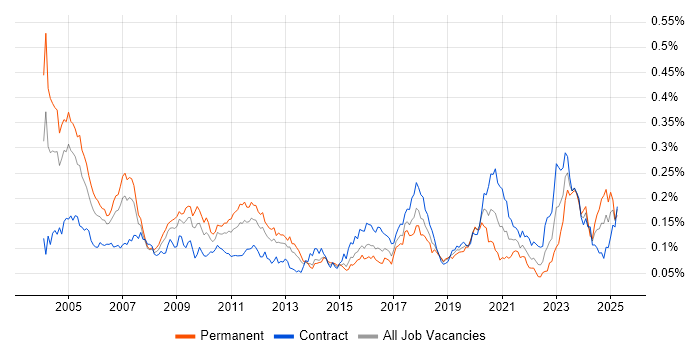Quant Analyst
England > London
The median Quant Analyst salary in London is £75,000 per year, according to job vacancies posted during the 6 months leading to 18 May 2025.
The table below provides salary benchmarking and summary statistics, comparing them to the same period in the previous two years.
| 6 months to 18 May 2025 |
Same period 2024 | Same period 2023 | |
|---|---|---|---|
| Rank | 362 | 492 | 595 |
| Rank change year-on-year | +130 | +103 | +248 |
| Permanent jobs requiring a Quantitative Analyst | 33 | 17 | 35 |
| As % of all permanent jobs advertised in London | 0.25% | 0.072% | 0.10% |
| As % of the Job Titles category | 0.28% | 0.076% | 0.11% |
| Number of salaries quoted | 31 | 17 | 30 |
| 10th Percentile | - | £56,850 | £56,750 |
| 25th Percentile | £65,000 | £77,500 | £57,500 |
| Median annual salary (50th Percentile) | £75,000 | £100,000 | £90,000 |
| Median % change year-on-year | -25.00% | +11.11% | +12.50% |
| 75th Percentile | £100,000 | £115,000 | £115,000 |
| 90th Percentile | £117,500 | £142,500 | £137,500 |
| England median annual salary | £75,000 | £100,000 | £80,000 |
| % change year-on-year | -25.00% | +25.00% | - |
All Permanent IT Job Vacancies
London
For comparison with the information above, the following table provides summary statistics for all permanent IT job vacancies in London. Most job vacancies include a discernible job title that can be normalized. As such, the figures in the second row provide an indication of the number of permanent jobs in our overall sample.
| Permanent vacancies in London with a recognized job title | 11,676 | 22,285 | 31,986 |
| % of permanent jobs with a recognized job title | 90.22% | 94.22% | 95.14% |
| Number of salaries quoted | 7,282 | 16,637 | 23,612 |
| 10th Percentile | £41,250 | £37,500 | £42,445 |
| 25th Percentile | £55,000 | £51,250 | £55,000 |
| Median annual salary (50th Percentile) | £75,000 | £70,000 | £72,500 |
| Median % change year-on-year | +7.14% | -3.45% | +3.57% |
| 75th Percentile | £100,000 | £93,750 | £95,000 |
| 90th Percentile | £122,500 | £115,000 | £115,000 |
| England median annual salary | £56,500 | £53,000 | £60,800 |
| % change year-on-year | +6.60% | -12.83% | +1.33% |
Quantitative Analyst
Job Vacancy Trend in London
Job postings that featured Quantitative Analyst in the job title as a proportion of all IT jobs advertised in London.

Quantitative Analyst
Salary Trend in London
3-month moving average salary quoted in jobs citing Quantitative Analyst in London.
Quantitative Analyst
Salary Histogram in London
Salary distribution for jobs citing Quantitative Analyst in London over the 6 months to 18 May 2025.
Quantitative Analyst
Job Locations in London
The table below looks at the demand and provides a guide to the median salaries quoted in IT jobs citing Quantitative Analyst within the London region over the 6 months to 18 May 2025. The 'Rank Change' column provides an indication of the change in demand within each location based on the same 6 month period last year.
| Location | Rank Change on Same Period Last Year |
Matching Permanent IT Job Ads |
Median Salary Past 6 Months |
Median Salary % Change on Same Period Last Year |
Live Jobs |
|---|---|---|---|---|---|
| Central London | +40 | 26 | £75,000 | -25.00% | 9 |
| Quantitative Analyst England |
|||||
Quantitative Analyst Skill Set
Top 30 Co-occurring Skills and Capabilities in London
For the 6 months to 18 May 2025, Quantitative Analyst job roles required the following skills and capabilities in order of popularity. The figures indicate the absolute number co-occurrences and as a proportion of all permanent job ads across the London region featuring Quantitative Analyst in the job title.
|
|
Quantitative Analyst Skill Set
Co-occurring Skills and Capabilities in London by Category
The follow tables expand on the table above by listing co-occurrences grouped by category. The same employment type, locality and period is covered with up to 20 co-occurrences shown in each of the following categories:
